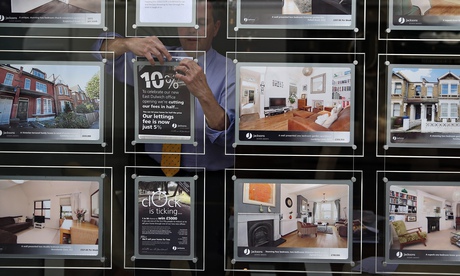Average UK house price rose 0.9% to £250,000 in December
02-20-2014
The rise trebled stamp duty for a typical home purchase to £7,500 – bad news for would-be buyers trying to raise a deposit
Hilary Osborne
The Guardian
Estate agents' advertisements

Stamp duty leaps from 1% of the value of a home between £125,000 and £250,000 to 3% above that threshold. Photograph: Dan Kitwood/Getty Images
The price of an average UK home sold in December last year hit a record £250,000, according to official figures, trebling the stamp duty for a typical home purchase to £7,500.
The stamp duty thresholds mean the bill for homebuyers leaps from 1% of the value of of a home purchase between £125,000 and £250,000, to 3% above the £250,000 threshold. Someone buying a £249,000 home will pay the exchequer £2,490, but on a £251,000 home the tax is £7,520.
The Treasury made £4.9bn from the tax in the 2012/13 financial year, but the news will be unwelcome for buyers already struggling to raise deposits and meet other costs, and could put pressure on the Chancellor, George Osborne, to consider changing the thresholds in his March budget.
In 2007, David Cameron pledged to abolish stamp duty for first-time buyers on homes costing up to £250,000, but thresholds remain at the same level as before he came to power.
Lucian Cook, head of residential research at the estate agency Savills, said that if the threshold for the 3% rate had moved up in line with house prices since its introduction in 2000 it would now stand at £550,000.
But he has calculated that raising the threshold to £500,000 would cost the Treasury around £1bn a year. "Stamp duty has become the ultimate form of stealth taxation and correspondingly a serious earner for the Treasury," he said. "The failure to increase thresholds presents another barrier to people seeking to get on and move up the housing ladder, adding to the inefficiencies in an already fractured housing market."
Matthew Pointon of Capital Economics said data from the Land Registry showed more than 70% of sales in December were below the 3% stamp duty threshold, so it was still not a problem for the majority of buyers. "That said, stamp duty is one of the worst designed taxes around," he said. "By placing a cost on moving home, it restricts labour mobility, which can lead to higher unemployment. And because the entire value of a property is liable for the tax once its value reaches a certain level, it causes significant pricing distortions."
However, Pointon said if the threshold was moved upwards "that would quickly be reflected in higher house prices". Howard Archer, chief UK economist at IHS Global Insight, is also against an increase. "The housing market really does not need anything to act as a further stimulus," he said.
The ONS figures, which are based on mortgage completions data supplied by banks and building societies, showed that UK house prices rose by 0.9% in December and ended the year up 5.5% on the previous year. Since the end of 2011, the average price has increased by £36,000, despite wages rising at less than the level of inflation.
Government stimulus in the form of Funding for Lending, which made money available to bank and building societies to offer mortgages, and the more recent Help to Buy schemes have helped to drive up prices, but growth in London has been behind most of the change. Prices in the capital increased by 12.3% over the year, to an average of £450,000, and if rises in London and the south-east were stripped out of the overall UK figures, the annual price rise would be just 3.1%.
First-time buyers have experienced high price inflation, with the average sum paid rising by 7.4% over the year, to £189,000. Movers saw a lower rate of change, at 4.7%, but paid an average of £286,000.
Campbell Robb, chief executive of the housing charity Shelter, said the figures showed that "house prices are still spiralling out of control". He added: "Schemes like Help to Buy are only making the problem worse by inflating house prices further. To give the next generation a fighting chance, the government needs to get serious about building more affordable homes now."
Buyers have been facing a squeeze as a lack of properties for sale has pushed up house prices. To make things worse, in some parts of the country estate agents are attempting to encourage homeowners to bring their properties onto the market by cutting sellers' fees and asking buyers to pay a fee if their bid for a property is successful.

